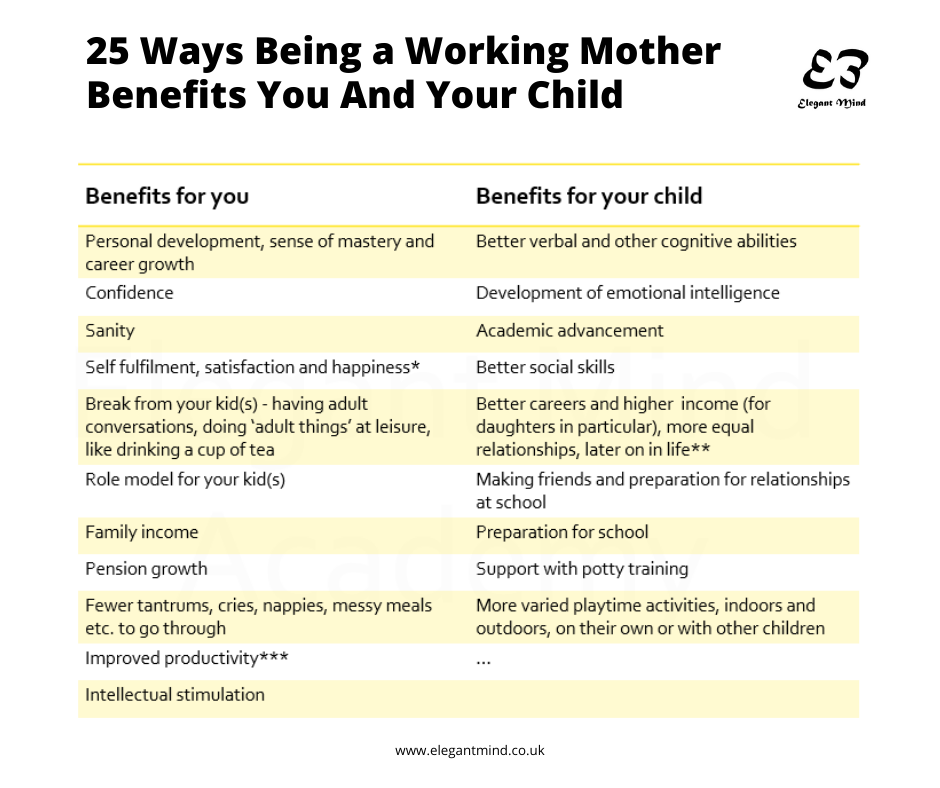
Returning to work after maternity leave can be frightening and anxious. 36% of women felt judged negatively by friends and family for going back to work. We have to deal with child sicknesses, stressful schedules, competing demands, lack of time to care for our own mental and physical health. And on top of that comes the working mom guilt. Some say we’re part-time mothers – neither fully invested in our jobs, nor in raising our children.
When I transitioned back to work after having Dominic, I wanted to have a happy, fulfilled and balanced life – just like everyone else!
Having a flexible employer and a helping partner certainly helped me.
But what’s most important is how you think and feel about being a working mother and sending your child to daycare.
If you think about it negatively, this will have a knock-on effect on how you cope with challenges and, ultimately, the success of your transition.
There will, of course, be sacrifices and compromises – the balancing, the hard work, missing on some milestones. Pretending that none exist doesn’t help either.
So the best strategy to cope with the working mom guilt is to reconcile those trade-offs by being crystal clear why you are making them.
So here are 25 great reasons why being a working mother and starting daycare will benefit both you and your child in the short and long term.

Benefits for you
- Personal development, sense of mastery and career growth – you can apply your specialist knowledge, develop your skills and strengths and become the best version of your professional self.
- Intellectual stimulation – while bringing up your child is hugely stimulating on its own, it’s different from the intellectual stimulation you can get from your job, working towards a promotion, picking up a new task etc.
- Confidence – you’ve learned a lot from being a mother. And you do a great job at work. This should only make you proud and confident in your abilities to tackle everything.
- Self-fulfilment, satisfaction – you can make a difference outside of your home and feel fulfilled in a way motherhood only can’t fulfil you.
- Happiness – working mothers tend to be happier and show fewer depression symptoms than stay at home moms, according to this study.
- Break from your kid(s) – at work you can have adult conversations and do ‘adult things’ at leisure, like drinking a cup of tea.
- Being a role model for your kid(s) – they will grow up seeing you as a hard-working woman who balanced and succeeded in both being a mother and a working professional.
- Family income – very few families have a single breadwinner these days. Your income will ensure a better lifestyle for your family.
- Pension/retirement growth – your retirement may be far from today but you will grow a bigger retirement fund the more you contribute to it now.
- Sanity – the daycare staff have had a decent night’s sleep, enjoy their work and are paid to change nappies, manage tantrums and clear up food thrown on the floor. So you will go through fewer of these.
Benefits for your child
- Better verbal and other cognitive abilities – more frequent use of formal childcare also results in better verbal and nonverbal abilities as well as interaction with others
- Development of emotional intelligence – through more frequent and varied interaction with other kids your child will learn to understand other people’s emotions, label them as well as act appropriately.
- Academic advancement – University of London research found that children who had spent three years or more in nursery education could advance their academic attainment by up to a year over those whose parents kept them at home until the age of five.
- Better social skills – your child benefits from playing with other children from diverse backgrounds, making friends, gaining confidence, sharing and taking turns.
- Better careers and higher income (for daughters in particular), more equal relationships, later on in life – according to Harvard Business School Research.
- Preparation for school – children learn to adapt easily to a learning environment, have greater social skills, feel more secure and have confidence in relating to adults.
- Independence and responsibility – daycare encourages your child to find and use a tissue for their nose, wash their hands, tidy toys and many more independent actions.
- Support with potty training – every little helps 🙂
- More varied playtime activities, indoors and outdoors, on their own or with other children – including messy play activities such as water, sand, paint and glue.
Motivation statement: your weapon against the working mom guilt
To make this as powerful as possible, I’d recommend you pick 3 of the above which resonate with you most. These are your strongest motivators.
And it may sound silly but write them down somewhere in this form:
Sending [insert child’s name] to daycare will benefit him/her immensely in [describe how]. This makes me [describe how you feel]. Me going back to work will benefit me [describe in what way]. This makes me [describe how you feel].
Here’s what mine looks like:
Sending Dominic to daycare will benefit his language development immensely as he’s a bilingual child and we only speak Bulgarian at home. I’m also proud he will grow up seeing his mother succeed in her career and his father help at home. Hopefully, he will grow up to be more respectful and loving as a result.
I enjoy my work, the challenges it brings, the opportunities to learn new things and that it fulfills me in a different way from the way motherhood and raising him does.
This makes me happy, proud and extremely excited about the future.
Now take a picture of yours and add it to your favourites.
Next time you are struggling cope with the working mom guilt or to remember why you’re making those sacrifices, why it’s all worth it, refer to these top 3 motivators.
This has been my best tool to deal with the sadness and challenging times and I can’t recommend it enough!
Conclusion
Us, working mothers, just like everyone else, deserve to have a happy, fulfilled and balanced life. Yes, there are sacrifices we make by going back to work. But giving in to the working mom guilt will not help you but only accentuate the challenges. Instead, reconcile those trade-off by being crystal clear why you’re making them. And there isn’t a shortage of great reasons why this is in both our own and our child’s best interest. Both in the short and long-term.
Do you feel like you’ve transitioned back to work but you still do the lion share of the childcare and household tasks? Check out these tips for getting your partner to do his equal share!










What do you think?